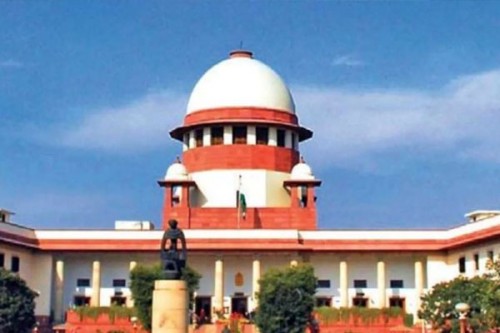SC tells states around Delhi to stop stubble burning, asks Centre to revisit MSP on Paddy in Punjab

New Delhi, Nov 7 (IANS) The Supreme Court on Tuesday posed several crucial questions to the Punjab government on the issue of stubble burning and the resultant pollution in Delhi.
The bench of Justice Justices Sanjay Kishan Kaul and Sudhanshu Dhulia passed directives to stop stubble burning, saying that residents of Delhi are suffering because they can't find a solution. This has been going on for the past five years. The matter requires immediate action and court monitoring.
The bench passed several directions to the states bordering Delhi-NCR including Uttar Pradesh, Rajasthan, Punjab, and Haryana to stop stubble burning and take immediate steps to curtail the air pollution. The court said that local SHO should be made responsible for looking into stubble burning under the supervision of the Chief Secretary.
The court, while hearing the parties involved, said that this can't be a political battle. The court also asked why paddy was being grown in Punjab when the water tables were already so low.
"What are you doing? Look at your water table. Why are you allowing paddy in Punjab? You want to turn Punjab into a land of no crops from the green land," the bench remarked.
Attorney General Gurminder Singh appearing for Punjab along with making several suggestions said that there is an MSP on paddy crops in Punjab. This makes the marginal farmers opt for the crop. If the MSP goes, they will automatically switch to less water-intensive crops.
The SC in its order took note of this suggestion that a serious look is required whether this kind of paddy that leaves stubble as a byproduct should be grown in the time period in which it is grown.
The AG said that 15 years ago this problem did not arise because such cropping did not take place. The farmers are burning stubble on account of the economic situation. The alternatives given are not being adhered to. Since farmers are unwilling to bear the cost of machines purchased, it is suggested that Punjab is ready to bear 25 per cent cost of machines for tackling stubble waste, the Delhi government can bear 25 per cent cost and the Centre may bear 50 per cent.
The SC took note of this and said that if the Centre can spend so much on subsidies, they can also bear this court. The bench also noted that since the Centre is already working to switch to millets, then this paddy must be switched with some other native and less water-intensive crop.
The court further directed the stakeholders to act promptly in respect of the aforesaid aspects and asked the Cabinet Secretary to call for a meeting on Wednesday with all stakeholders on this issue.
It was further observed by the apex court in its order that adherence to the Food Security Act by Punjab is creating problems and the government should look into it.
The top court also said that the smog tower installed in Delhi as per earlier order is not working, and called the same 'ludicrous' and asked for it to be repaired.
Calling schemes like 'odd-even' to tackle such an issue mere 'optics', the bench further directed the state governments to control the entry of orange-tagged vehicles, saying that a large number of taxis in Delhi have registrations in different states that carry only one passenger. Asks these to be monitored so that only Delhi taxis ply during the current period.
The matter is again listed on Friday.

|

|

